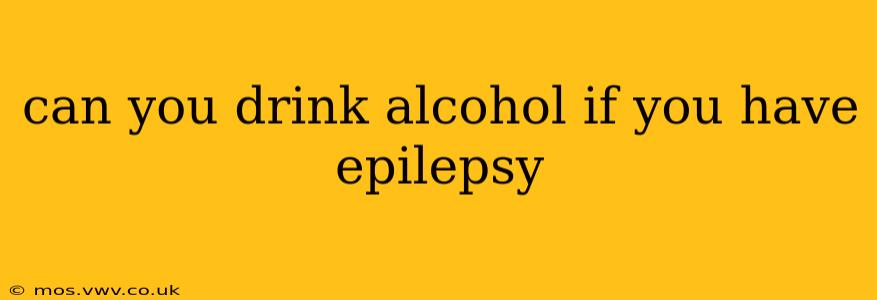Can You Drink Alcohol if You Have Epilepsy?
The relationship between alcohol and epilepsy is complex and warrants careful consideration. While there's no blanket "yes" or "no" answer to whether someone with epilepsy can drink alcohol, the general consensus among neurologists and epileptologists is that alcohol consumption should be approached with extreme caution, if at all, by individuals with epilepsy.
The reason for this caution stems from alcohol's potential to trigger seizures in several ways:
-
Direct CNS Depressant Effects: Alcohol is a central nervous system (CNS) depressant. This means it slows down brain activity. For someone with epilepsy, whose brain is already prone to abnormal electrical activity, this added depression can lower the seizure threshold, making seizures more likely.
-
Withdrawal Effects: Alcohol withdrawal can also trigger seizures, particularly in individuals with a history of heavy or prolonged alcohol use. The abrupt cessation of alcohol consumption after periods of heavy drinking can lead to severe withdrawal symptoms, including seizures, delirium tremens (DTs), and other life-threatening complications.
-
Interaction with Medications: Many epilepsy medications interact negatively with alcohol. This interaction can either reduce the effectiveness of the anti-seizure medication or increase the risk of side effects, including increased drowsiness, dizziness, and potentially, seizures. Always consult your doctor or pharmacist before mixing alcohol with any medication.
What are the risks of drinking alcohol with epilepsy?
The risks of drinking alcohol while having epilepsy are significant and can include:
-
Increased Seizure Frequency: This is perhaps the most concerning risk. Alcohol can provoke more frequent seizures, even in individuals who haven't experienced seizures for a long time.
-
Increased Seizure Severity: Not only can alcohol increase the frequency of seizures, but it can also make them more severe, potentially leading to longer seizures and increased risk of injury.
-
Status Epilepticus: In severe cases, alcohol consumption can trigger status epilepticus, a life-threatening condition characterized by a prolonged seizure lasting more than five minutes or a series of seizures without recovery in between.
-
Medication Ineffectiveness: As mentioned above, alcohol can interfere with the efficacy of epilepsy medications, rendering them less effective in preventing seizures.
How much alcohol is too much for someone with epilepsy?
There's no safe level of alcohol consumption for individuals with epilepsy. Even moderate drinking can increase the risk of seizures. The safest course of action is complete abstinence. However, if you are an individual with epilepsy considering any alcohol consumption, it’s crucial to discuss this thoroughly with your neurologist or epileptologist. They can assess your individual risk factors and provide personalized recommendations. It's important to remember that individual responses to alcohol vary significantly.
Can alcohol cause epilepsy?
While alcohol doesn't directly cause epilepsy in the same way a genetic predisposition or brain injury might, chronic and heavy alcohol abuse can contribute to a condition called alcohol-related seizures. These seizures often occur during alcohol withdrawal and can be a sign of more serious neurological problems.
What should I do if I have epilepsy and have accidentally consumed alcohol?
If you have epilepsy and have consumed alcohol, monitor yourself closely for any changes in your condition. If you experience any signs of a seizure, such as unusual sensations, muscle twitching, or loss of consciousness, seek immediate medical attention.
Is it possible to have a drink occasionally if I have well-controlled epilepsy?
Even with well-controlled epilepsy, the risks associated with alcohol consumption remain. The potential benefits of occasional alcohol consumption are vastly outweighed by the potential risks of triggering seizures or interacting negatively with your medication. Consult your neurologist before considering even occasional alcohol consumption.
In conclusion, while there's no definitive "yes" or "no" answer to the question of alcohol consumption for those with epilepsy, the safest and most recommended approach is complete abstinence from alcohol. This significantly reduces the risk of seizures, medication interactions, and other complications. Always prioritize your health and consult your healthcare provider for personalized advice tailored to your specific situation.
